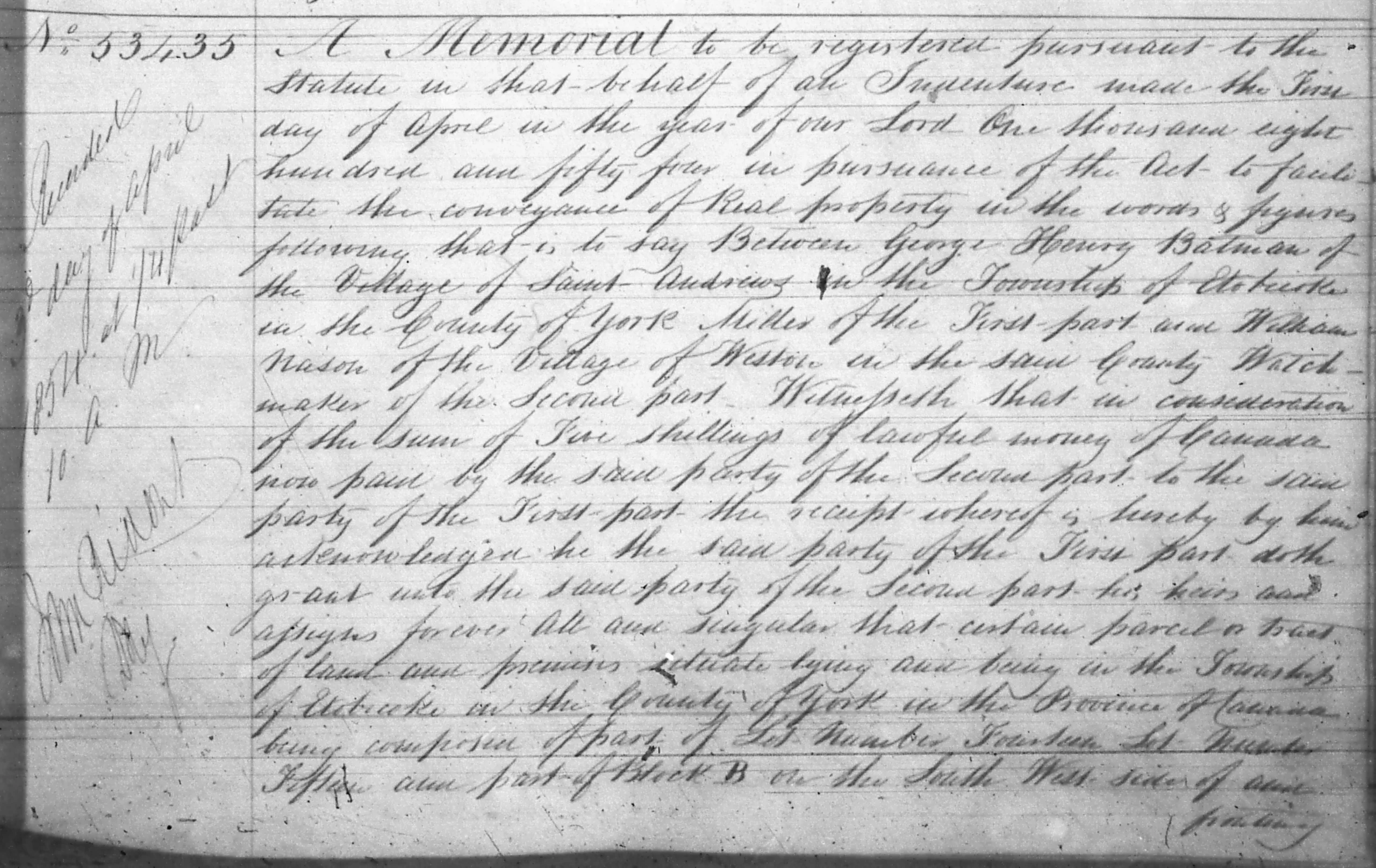Land registrations
Research registrations of private land transactions in what is now called Ontario from 1795 to the 1880s for most counties and up to 1955 for a small number of counties.

About land registrations
When privately held land is sold in Ontario, the transaction must be registered with the Land Registry Office.
Private land transactions have been registered with local offices since 1795. It became mandatory in 1846. These were filed at local offices.
Parties involved in private transactions filed a deed of sale (the transaction document) with the local Registry Office.
Until 1865, many wills were registered with Land Registry Offices instead of being probated in court. These wills are covered on this page. For wills that were probated in court, visit our wills and estates topic page.
What land registration records might tell you
Land registration records include valuable information about property ownership including:
- sales
- bankruptcies
- liens
- wills
- other documents affecting ownership of a specific plot of land
Transcriptions of wills filed at the Land Registry Offices provide information on family and heirs, including those who inherited property and their relationship to the deceased.
Types of private land registration records we have
We hold three types of land registration records.
Instruments and deeds are the original transaction documents for the sale of land.
Copybooks of instruments and deeds contain an official transcript or summary of the original transaction documents (known as instruments and deeds) and until 1865 could also include wills. These are available in person on microfilm for self-service research.
General registers contain copies of wills after 1865. These are available in person on microfilm for self-service research.
We have two indexes for searching these records.
Abstract indexes are arranged by county and township, then concession and lot; or, for cities, by subdivision number. They provide the:
- instrument number
- names of both parties
- type of transaction (“B and S” means bargain and sale)
- size of the property (number of acres)
- date of transaction
- date of registration
- amount of money involved
Name indexes are alphabetical lists for the province as a whole that provide only the instrument number.
Land registry records after the 1880s
Go to the Ontario Land Registry Office (ONLAND) web portal to search and request land registry records from after the 1880s, including Land Title.
Information you need to search
To effectively research land records, you need to know the:
- lot and concession (or the address or subdivision number in towns and cities)
- name of one or both parties
- township or town where the property was located
- county or northern district the township or town was part of
- year when the transaction occurred (note: some transactions were recorded decades after they occurred)
Steps to find land registration records
Researching land registration records is a two-step process.
First, you need to find the instrument number. Then you need to search the copybooks of instruments and deeds.
Related records
If you can’t find what you’re looking for in Land registrations or want to conduct further research, you can try searching related records and resources.
Crown land records provide information about people who petitioned for, were granted and settled land in what is now Ontario from the late 1700s to the early 1900s.
Land Registry Office (external resource)
Land title records and the following land registration records, from 1795 to present, available online.
For more information about the Land Registry system, see A Guide to Ontario Land Registry Records (Toronto: Ontario Genealogical Society, 1993). A copy is available in our Reading Room and at some public libraries in Ontario.
Get research help
We can point you to resources to help you with your research. Contact us.
For professional research help, we have a list of private companies and freelance researchers who can do research on your behalf.
Glossary
Abstract Indexes: indexes to the instruments and deeds for a given township or town, arranged by lot and concession (or subdivision) number.
Alphabetical Indexes: indexes to the instruments and deeds for a given township or town, arranged by name of the parties.
Copybooks of instruments and deeds: transcriptions made by Land Registry Office staff of instruments and deeds registered with them.
General Registers: transcriptions of wills filed at the Land Registry Offices, beginning in 1865; wills registered prior to 1865 would be found in the copybooks of instruments and deeds.
Instruments and deeds: these are the original documents filed by the parties. They include sales, bankruptcies, liens, wills, and other documents transferring or affecting ownership.
Probate/probated: the legal process that validates a person’s will after they have deceased. Overseen by the courts.
